Review: INTER ALIA at National Theatre (Lyttelton)
As legal high flyer Judge Jessica Parks, Rosamund Pike delivers a multi-faceted central performance with vigour and élan in Suzie Miller’s legal family drama INTER ALIA, which began its run at National Theatre’s Lyttelton stage this week.
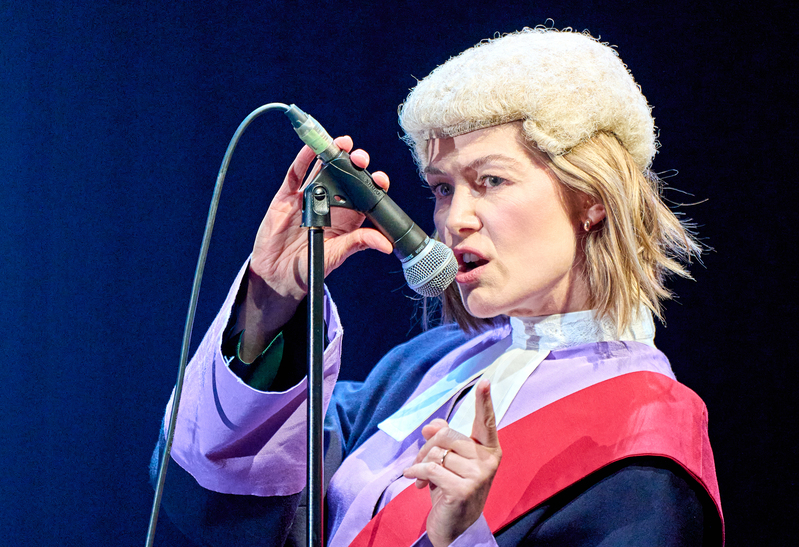 Rosamund Pike (Jessica) in Inter Alia at the National Theatre. (c) Manuel Harlan
Rosamund Pike (Jessica) in Inter Alia at the National Theatre. (c) Manuel Harlan
When not presiding over sensitive rape cases at court, Jesse is wife to barrister Michael (Jamie Glover) and a fretting mother to son Harry (Jasper Talbot). Through a sequence of flashbacks which ebb and flow seamlessly with the present, we see Harry as a very young boy and experience his mother’s anxiety and determination to raise a young man who respects girls and women.
In the early part of the play (which runs 1 hour 40 minutes straight through without an interval), we learn of Jesse’s drive to suppress the inevitable patriarchal smugness of barristers in her court. Breathing into her microphone whilst accompanied by guitar and drums, she unpicks the staid remnants of historical courtroom hierarchy, revelling in the control she can wield as a woman with the power to ensure victims are treated with respect. This is particularly relevant during the overzealous cross-examination of plaintiffs by defence teams who invariably deploy discrediting tactics. She intercedes using her status and soft skills to stymie their efforts with a tone which cuts through tendons and bone. It is one of several feminist highlights that audibly strike a chord with female audience members. Another, almost gets lost in the freneticism of her excitable preparations for a large dinner party, where she dashes back and forth only to have Michael swagger into the scene with his single notable contribution to proceedings, the cheese, which she notes wryly, has been delivered!
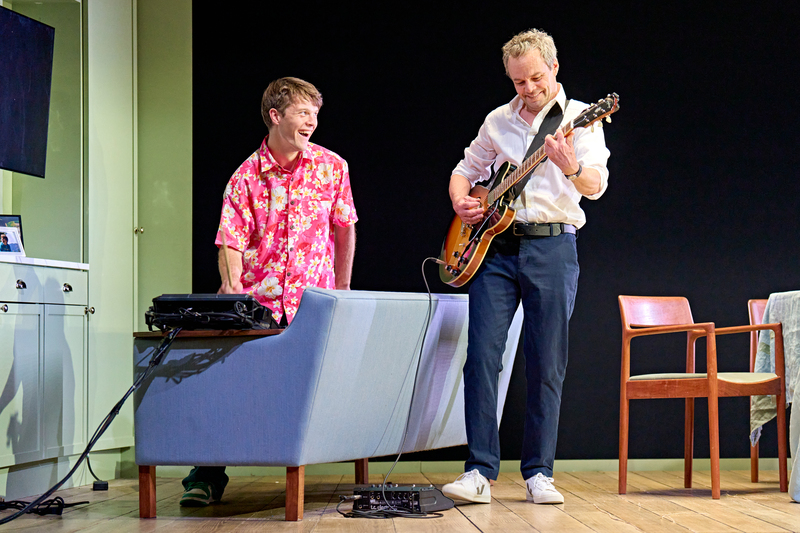 Jasper Talbot (Harry) and Jamie Glover (Michael) in Inter Alia at the National Theatre. (c) Manuel Harlan
Jasper Talbot (Harry) and Jamie Glover (Michael) in Inter Alia at the National Theatre. (c) Manuel Harlan
We chuckle as she dives in and tackles head-on those awkward and embarrassing conversations between parent and youth. The dialogue deployed in these scenes is frequently laced with stilted and mortifying subject matter for her son, which alludes to bullying, grooming, physical development, sex and consent. It is evident that her work and home life overlap and impact each other in situations which, for men, have traditionally been far easier to compartmentalise and separate. The watching of porn and the events at a frat party during which Harry may have had sex with a girl he has known since childhood, create the most uncomfortable of all conflicts. The situation becomes the crux of the play, testing Jesse’s inclination to save her son’s future, threatened by an uncharacteristic decision, tempered by her long held conviction to protect innocent girls whose lives can be forever tainted by the stigma and trauma of rape.
The parallels with Miller’s other legal hit Prima Facie (also directed by Justin Martin) are obvious, as she assesses the fitness for purpose of the current justice system when applying onus of proof protections to defendants. Exploring this vein, one of the most powerful and harrowing moments in an otherwise often funny and enlightening production, occurs when Michael breaks down. Convulsed in tears, he has realised his personal limitations in offering useful advice to his son, given that his generation had always promoted the idea that pursuing a girl until she relented to sexual congress, was considered part of the mating game and as such, widely condoned by society as acceptable behaviour. By its very nature, this moment underpins how much society and attitudes have changed, and just how much the law still needs to catch-up.
INTER ALIA (among other things) continues its run at the National Lyttelton until 13 September.
Latest News
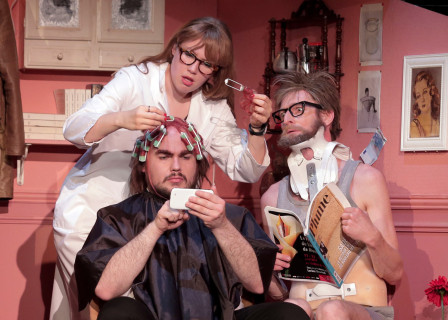
 Review: FISH BOWL at Peacock Theatre
29 January 2026 at 13:58
Review: FISH BOWL at Peacock Theatre
29 January 2026 at 13:58

 Regent's Park Open Air Theatre announces 2026 season
29 January 2026 at 10:34
Regent's Park Open Air Theatre announces 2026 season
29 January 2026 at 10:34
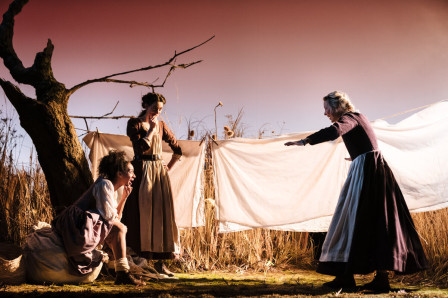
 Cast announced for 1536's West End Transfer
28 January 2026 at 18:30
Cast announced for 1536's West End Transfer
28 January 2026 at 18:30
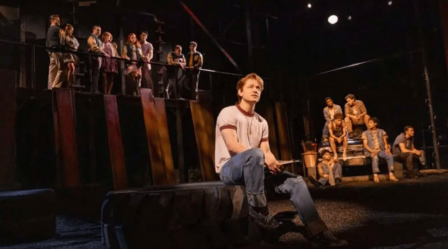
 Hit Broadway Musical THE OUTSIDERS to Transfer to the West End
28 January 2026 at 17:45
Hit Broadway Musical THE OUTSIDERS to Transfer to the West End
28 January 2026 at 17:45